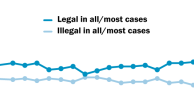Overview
About six-in-ten Americans (62%) have heard about the proposed federal rule that would require employers, including most religiously affiliated institutions, to cover birth control as part of their health care benefits. Among those aware of the issue, opinion is closely divided over whether these institutions should be given an exemption to the rule if they object to the use of contraceptives: 48% support an exemption and 44% say they should be required to cover contraceptives like other employers.
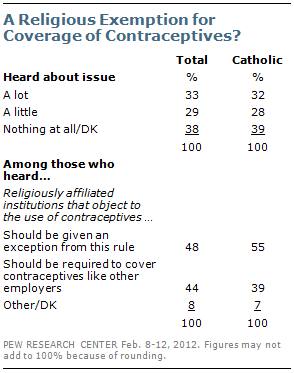
The latest national survey by the Pew Research Center for the People & the Press and the Pew Forum on Religion & Public Life, conducted Feb. 8-12 among 1,501 adults, finds sharp divisions on the issue by religious affiliation, party and ideology.
The Obama administration announced Feb. 10 that it would modify the mandate in response to criticism that the rule would force religious organizations to violate their religious beliefs in providing contraception coverage. The survey shows little difference in opinions among people interviewed before the administration’s proposed modification on Feb. 10 and those interviewed afterwards.
Among Catholics who have heard at least a little about the issue, 55% favor giving religious institutions that object to the use of contraceptives an exemption from the federal rule, while 39% oppose exempting those institutions. White evangelical Protestants, by an even larger margin (68% to 22%), favor giving religious institutions an exemption. White mainline Protestants are divided (44% favor an exemption, 46% are opposed). By contrast, a majority (55%) of the religiously unaffiliated who have heard about the issue say religious institutions that object to the use of contraceptives should be required to cover them like other institutions, while 39% favor giving an exemption to these institutions.
There also are wide partisan and ideological divisions in opinions about the issue. Nearly three-quarters (73%) of Republicans, and 82% of Republican and Republican-leaning independents who agree with the Tea Party, favor giving religious institutions that object to contraceptives an exemption from the new federal rule. By about two-to-one (64% to 29%), Democrats say religious institutions should be required to cover contraceptives like other employers; liberal Democrats (72%) are more likely than conservative and moderate Democrats (58%) to favor this approach.
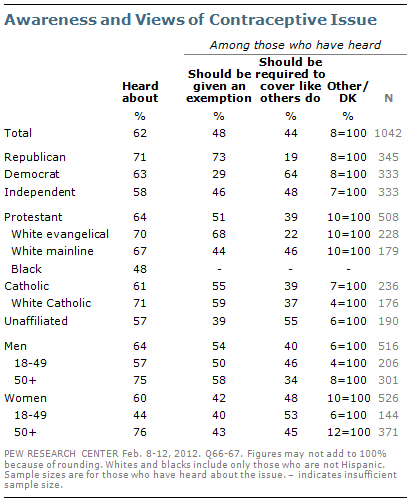
Independents are split: 48% say religious institutions that object to the use of contraceptives should be required to cover them like other employers, while 46% favor giving religious institutions an exemption.
A narrow majority of men (54%) who have heard at least a little about this issue say religious institutions that object to the use of contraceptives should be given an exemption from the new federal rule. Only about four-in-ten women (42%) agree.
This issue has attracted much more attention from people at either end of the political spectrum than those in the middle. Overall, 71% of Republicans, 63% of Democrats and 58% of independents have heard at least a little about the new federal rule on contraceptive coverage. However, 65% of Republicans and Republican-leaning independents who agree with the Tea Party have heard a lot about this issue, compared with just 25% of other Republicans and Republican leaners. Among Democrats, about twice as many liberals (43%) as conservatives and moderates (21%) have heard a lot about the new federal rule on contraceptive coverage.
Awareness of the controversy is also far higher among older adults than among the young. Six-in-ten (60%) adults ages 18-29 have heard nothing about the issue, compared with just 24% among those 50 and older. Among people ages 30-49, 43% have not heard about it.
The contraception story was a particular focus of talk show hosts on cable and radio. According to the Pew Research Center’s Project for Excellence in Journalism, fully 24% of the time studied on talk shows on both radio and cable news channels during the past week was devoted to the contraception controversy. That contrasts with 8% of news coverage overall.
Where Catholics Stand
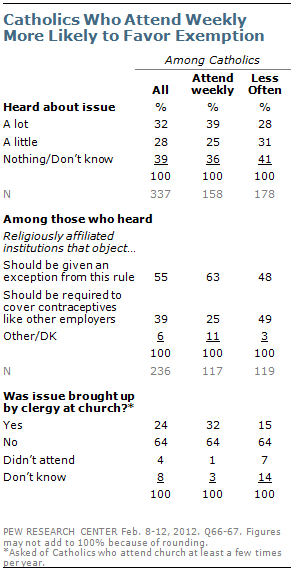
The issue of requiring contraceptive coverage is of particular relevance to Catholics, since many of the institutions that initially raised religious objections to the rule are affiliated with the Catholic Church. Along with white Protestants, white Catholics are more likely than members of other religious groups to say that they have heard at least a little about the issue. Among white Catholics, 71% say they have heard about the rule, as have 70% of white evangelical Protestants and 67% of white mainline Protestants.
While 55% of Catholics who have heard about the rule support an exemption to it, opinion varies considerably by frequency of church attendance. Among Catholics who attend Mass at least once a week, 63% support an exemption while 25% say religiously affiliated institutions should have to cover contraceptives like other employers. Among those who attend less often, opinion is evenly divided (48% favor an exemption, 49% oppose one).
About one-quarter of Catholic churchgoers (24%) report having heard about the issue in church. Among Catholics who report attending Mass weekly, 32% said the rule was brought up recently by their priest or other church official.
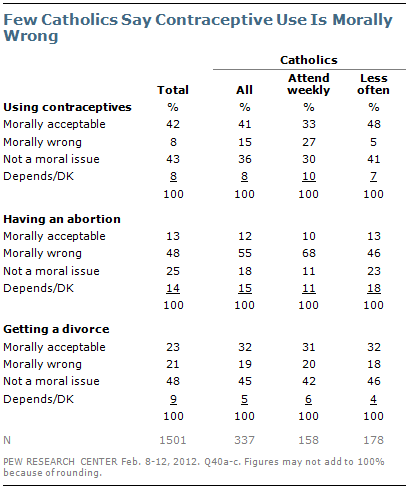
Although the use of contraception is forbidden by church doctrine, few U.S. Catholics regard the use of contraceptives as morally wrong. Just 15% of Catholics say that using contraceptives is morally wrong, while 41% say it is morally acceptable and 36% say it is not a moral issue. Even among Catholics who attend church weekly, just 27% say contraception is morally wrong.
By comparison, 55% of Catholics (and 68% of those who attend Mass weekly) regard having an abortion as morally wrong. Among the public overall, 48% regard having an abortion as morally wrong.
Another practice forbidden by church doctrine – getting a divorce – is regarded as morally wrong by only 19% of Catholics.
Reactions to Federal Court Decision on Same-Sex Marriage
Almost eight-in-ten Americans (78%) are aware of a federal court ruling last week that a California law banning same-sex marriage is
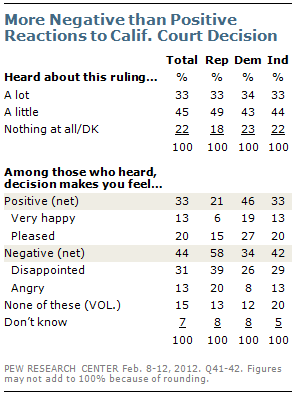
unconstitutional. One-in-three (33%) have heard a lot about the ruling, and 45% have heard a little about it.
Among those who have heard about the issue, more express negative than positive reactions to the ruling. More than four-in-ten (44%) say they are disappointed (31%) or angry (13%). Just a third (33%) say they are pleased (20%) or very happy (13%). About one-in-five (22%) volunteer that they have none of these reactions (15%) or have no opinion (7%).
A majority of Republicans (58%) say they are disappointed (39%) or angry (20%) about the court decision. Just 21% are pleased (15%) or very happy (6%). Democrats, on balance, have a positive reaction to the court’s ruling: 46% are either pleased (27%) or very happy (19%), while 34% are either disappointed (26%) or angry (8%). Independents’ reactions mirror those of the general public, with 42% expressing disappointment (29%) or anger (13%) and 33% saying they are pleased (20%) or very happy (13%).
Among religious groups, white evangelical Protestants have the most negative reactions to the verdict, while the views of white mainline Protestants and Catholics are more mixed. About six-in-ten white evangelical Protestants (59%) say they are either angry (25%) or disappointed (35%), compared with fewer than half of Catholics (42%) or white mainline Protestants (43%). Roughly a third in each of the latter groups is very happy or pleased with the ruling. Among those unaffiliated with a religion, 45% say they are very happy (20%) or pleased (25%) with the ruling, while 30% are disappointed (20%) or angry (10%).


